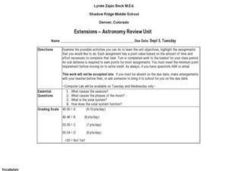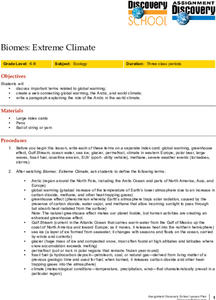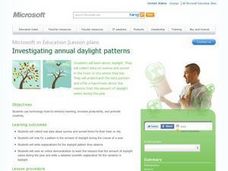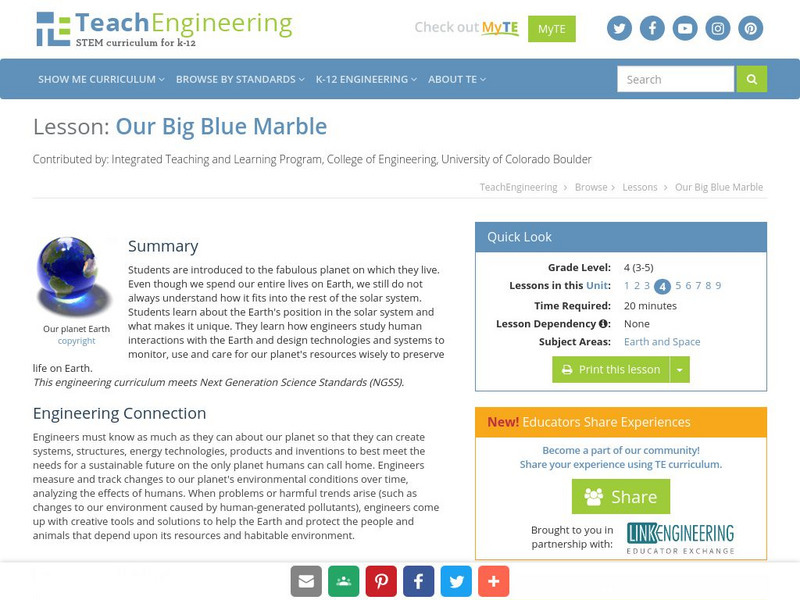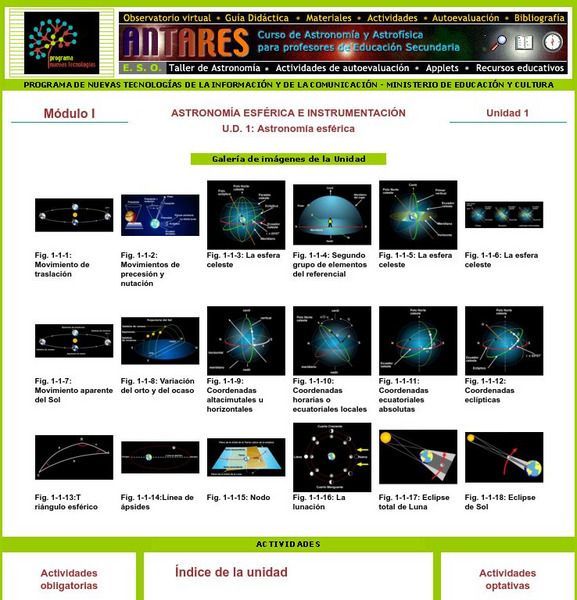Curated OER
Extensions - Astronomy Review Unit
Students participate in a review unit in Astronomy using the Layered Curriculum. This allows them to take charge of the type of assessment that is given. The method also allows better differentiation of instruction to occur.
Curated OER
Ancient Sun Models of the World
Students explain that many different cultures across the world developed their own reasoning for the weather around them. They explore the different cultural beliefs of the sun's cycle and to create their own story of the sun's movement.
Curated OER
Biomes: Extreme Climate
Students create a web connecting global warming, the Arctic, and wold climate. They write a paragraph explaining the role of the Arctic in world climate.
Curated OER
Extreme Climate
Middle schoolers discuss global warming, greenhouse effect, permafrost and other key words. In this climate lesson students create a web that connects global warming, the Arctic and world climate then write a paragraph explaining the...
Curated OER
Taking Risks: Drug and Alcohol Abuse
Students discuss a video about drug and alcohol abuse and their connection to risk-taking. They answer questions on a risk factor sheet about the use of tobacco, drugs, and alcohol. They discuss long and short term goals and how not...
Curated OER
"Checking In"
Students examine the checkpoints along the Iditarod Trail. They calculate the distances, mean and medians between each checkpoint. Using the internet, they follow along a virtual trail. They answer questions about when it would be more...
Curated OER
Musher Graphing and Probability
Students use the internet to research statistical information on the musher dogs participating in the Iditarod. Using the data, they create three different types of pie charts. They use the charts to answer questions about the dogs. They...
Curated OER
Watershed Management
Learners investigate the concept of a watershed. They conduct research into the concept using a variety of resources. Students take a field trip to a local watershed to make observations. The outcome is a report concerning the outside...
Curated OER
Investigating daylight
students investigate a natural factor affecting their everyday lives: daylight. First, they collect data on sunrise and sunset in their hometown, create a Microsoft Office Excel chart to help them understand the data pattern, and offer a...
BBC
Bb Ci Space: Earth
The BBC provides a general overview of the planet Earth. Content includes statistical information, a focus on the four seasons, moon information, and more.
NASA
Nasa: Earth: Overview: Our Home Planet
Provides a comprehensive look at the planet Earth including photos, how Earth got its name, and facts and figures about its size, seasons, moon, atmosphere, rotation, and lithosphere.
NASA
Nasa Star Child: The Planet Earth
Facts about the Earth including its orbit, its atmosphere, and its landforms. Includes a discussion question on seasons, with facts about them, and the answer. A linked page covers similar material in a "Level 2" version, and has a...
abcteach
Abcteach: Earth Day Activities
[Free Registration/Login Required] How can you treat the earth with more respect? Check out this resource featuring links to elementary activities to celebrate Earth Day. You will find word searches, crossword puzzles, reading...
Georgia Department of Education
Ga Virtual Learning: Astronomy: The Earth
In this interactive tutorial students will learn what causes the seasons, diurnal cycles and how the constellations move through the sky. Learn we are able to see other planets and how astronomical events affected life on the Earth.
PBS
Pbs Learning Media: Seasons on Earth and Mars
Compare the seasons on Earth and Mars with NASA imagery. Use this resource to visualize how the axial tilt of a planet influences its seasons and to compare data about seasonal changes on Earth and Mars. Support materials include:...
ClassFlow
Class Flow: Earth and Space the Seasons
[Free Registration/Login Required] This flipchart explores the relationship between the sun and earth and how the seasons happen. Vocabulary of the equinox, solstice, etc. is included.
ClassFlow
Class Flow: Earth's Movements in Space
[Free Registration/Login Required] This flipchart contains definitions for axis, rotation, revolution explanation of seasons and an assessment using Activotes.
TeachEngineering
Teach Engineering: Our Big Blue Marble
Learners are introduced to the fabulous planet on which they live. Even though we spend our entire lives on Earth, we still do not always understand how it fits into the rest of the solar system. Students learn about the Earth's position...
Ministerio de Educación (Spain)
Ministerio De Educacion: Atronomia Esferica Modulo I Unidad 1
Recognize the major constellations and learn about the sky during the different seasons of the year. You will also be able to measure the height of the mountains of the moon.
ClassFlow
Class Flow: Space
[Free Registration/Login Required] This flipchart describes what causes the seasons, explains the moon's phases, and introduces what a constellation is. It utilizes the Activotes to help describe the phenomena.
TED Talks
Ted: Ted Ed: The Science of the Game of Thrones
The popular television show, Game of Thrones, and the novel series it is based on, A Song of Fire and Ice, take place in another world. Joe Hanson explores possible scientific explanations of the phenomena exhibited on the show. [8:01]


